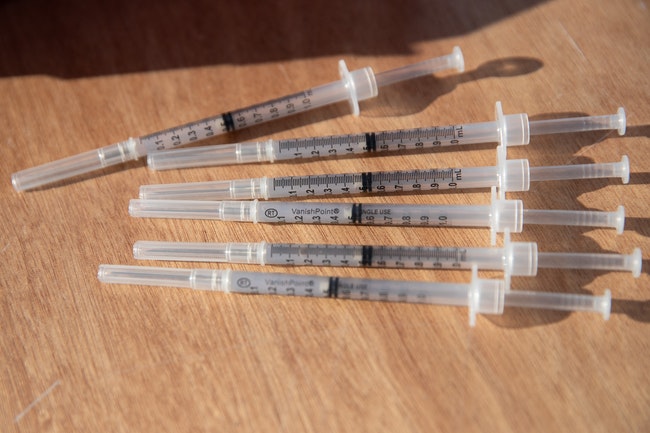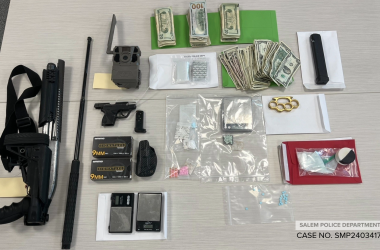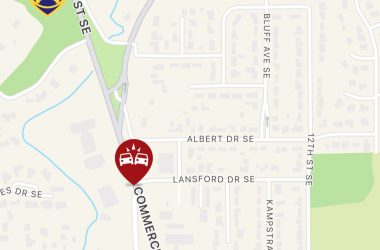
Moderna vaccine doses at a drive-thru COVID-19 vaccination clinic at Centennial Park in Woodburn, Ore. on Thursday, April 1, 2021. (Amanda Loman/Salem Reporter)
Gloria Rohl understands Covid is a serious disease for people with certain health problems.
But the 76-year-old Salem real estate broker said she has no desire to get vaccinated against it. She said she’s in good health and doesn’t believe the virus poses any more threat to her than the flu or norovirus.
“It doesn’t bother me because I figure if God wants me, he’s going to take me no matter what. I do think I’d pay closer attention if I had issues. To me, age is not a factor unless there’s something else involved,” she said.
Not long ago, arranging a Covid vaccination appointment was a challenge, and doses were restricted to people at higher risk. Now, public health agencies are seeing the opposite: more shots available than people willing to take them.
Rohl is one of the 25% of Americans that polls find are unlikely to get a vaccine against Covid.
According to public health agencies, changing some people’s minds about getting vaccinated will be key to reaching herd immunity, where enough people are protected against Covid that the virus can’t circulate freely in the community. That in turn would allow most state restrictions to fade away.
Herd immunity matters for people left exposed to Covid because they can’t get vaccinated because of a health condition. It also matters for children under 12, for whom there is no currently approved vaccine.
It’s a challenge public health agencies said they’ve been preparing for, with state and local authorities rolling out campaigns and working to get everyone from doctors to nonprofit leaders to share their own stories of vaccination.
But just telling people to get a shot doesn’t work.
Health experts said it’s important they understand the reasons people don’t want a vaccine or haven’t yet made an appointment.
“Starting from that place of empathy is really important,” said Marion Ceraso, associate professor of practice at Oregon State University’s College of Public Health and Human Sciences. “Sometimes I think we skip over that and we just jump right to our messages.”
Ceraso’s work focuses on public health communication. She said it’s all too easy to be judgmental toward people who have decided not to get a Covid vaccine, or assume that they all share the same reason for not taking the shot.
“The more we can really be affirmative and empathetic in our communication and not make assumptions upfront, and really understand what what the concerns people have (are), I think the more we make progress,” she said.
Polls of Americans have shown an array of reasons people choose not to get vaccinated.
Some are ideological, like a distrust of government or a strong belief in personal freedom.
Others are about the pandemic itself, whether it’s a feeling that the seriousness of the virus has been overblown or that someone isn’t personally at risk from Covid.
Many relate to the research and approval process for the vaccines.
And some are simply logistical, like people who can’t afford to take a day off work to recover from the fatigue and mild illness that are common after vaccination.
Registered Republicans, particularly younger Republicans, are more likely to say they don’t want a shot than Democrats or swing voters, according to national polling from DeBeaumont. Rural Americans were also less likely to say they would get vaccinated.
For Rohl, many reasons factor into her thinking. She said reports of breakthrough cases, where fully vaccinated people still get Covid, haven’t persuaded her that getting a shot actually prevents disease.
Such cases are rare – Oregon has so far recorded just 611 cases among 1.3 million people fully vaccinated against Covid.
She said much of the public health guidance over the course of the pandemic has seemed contradictory or lacking common sense, like messages until recently that fully vaccinated people still need to wear masks. And Rohl said she doesn’t believe the people administering shots as mass vaccination sites like the state fairgrounds know her medical history well enough to say whether she should get a shot.
“If I go to my doctor to get a vaccine, he has all my records, he can say this is good for you, this is not good for you,” she said. “I have problems with just doing something because I was told to.”
Rebekah, a mother of four in the Salem area, is among those who have decided not to get a shot – at least not for now.
She said the issue is so polarizing that she didn’t want her last name published for fear of being targeted for her decision.
Rebekah said she’s not anti-vaccine, and her children have received all their routine childhood shots. She just wants to wait until there’s better data on any long-term side effects from the vaccine.
“I don’t believe that there’s a chip in the vaccine,” she said. “I’m just not gung-ho on getting something that’s been put through very quickly.”
Rebekah said she had Covid in January with symptoms like a mild flu and no lingering side effects. Like Rohl, she knows the disease is serious for some people, though she also thinks its risks for most people have been exaggerated and more Covid restrictions should be lifted.
Jenna Wyatt, communications coordinator for the Marion County Health and Human Services Department, said the county is working to address such concerns to persuade some people to change their minds. Some people’s concerns are based on false information circulating online about side effects, she said.
“There’s really people who have heard the vaccine causes infertility or just another myth,” she said.
Polls show different reasons for getting vaccinated resonate with different people. Both Wyatt and Ceraso said having a variety of responses to people’s concerns is important, as is talking about the benefits of vaccination.
Key to Marion County’s strategy is talking to health care providers so they can capably respond to questions from patients. Wyatt said that’s important because people, especially those who think the pandemic has been politicized, are more likely to trust someone they know than a public service message from the health department.
“It’s not coming from the government – it’s coming from their health care provider they’ve been seeing for years,” Wyatt said.
For people who are young and healthy or don’t see Covid as a personal threat, Wyatt said it’s helpful to talk about vaccination as a tool that will allow normal daily life to resume sooner.
She said it’s also important for people to understand that the more people the coronavirus infects, the more chances the virus has to mutate and develop variants that could render vaccine less effective.
She said that’s why having more people vaccinated matters, even for those unlikely to die from Covid.
“We really try to explain that it’s about preventing variants. As more people become vaccinated, we really have better control on the spread of the virus,” she said.
Wyatt said she expects more people will choose to get a vaccine once they see how doing so benefits others they care about.
“It really comes down to people they know and trust getting it and having a positive experience – not getting sick with Covid, they’re not as worried about people,” she said. “I think given time, most people will really come around and see that their friends, their family aren’t having long-term side effects so it’s really safe.”
This article was updated to add an additional quote from Ceraso.
Contact reporter Rachel Alexander: [email protected] or 503-575-1241.
JUST THE FACTS, FOR SALEM – We report on your community with care and depth, fairness and accuracy. Get local news that matters to you. Subscribe to Salem Reporter starting at $5 a month. Click I want to subscribe!

Rachel Alexander is Salem Reporter’s managing editor. She joined Salem Reporter when it was founded in 2018 and covers city news, education, nonprofits and a little bit of everything else. She’s been a journalist in Oregon and Washington for a decade. Outside of work, she’s a skater and board member with Salem’s Cherry City Roller Derby and can often be found with her nose buried in a book.









